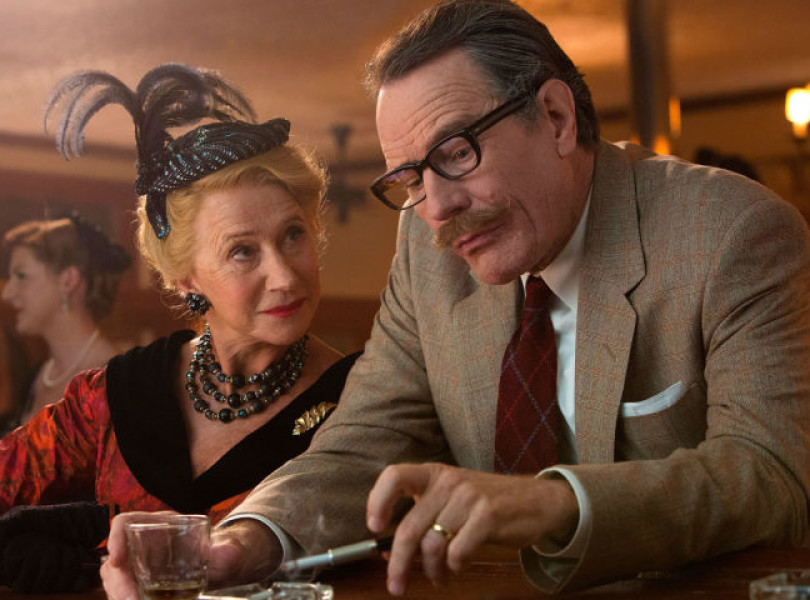Bryan Cranston’s screenwriter Dalton Trumbo is all superhero with no cape.
By Josh Lasser
“Are you now, or have you ever been, a member of the Communist party?” The question is an immediate signifier of some of the darkest days in this country’s history and the ways in which our government can go too far. And what of those people who refused to answer when the question was asked? Director Jay Roach and star Bryan Cranston attempt to examine one particular case with the new film Trumbo.
Cranston stars in the film as blacklisted screenwriter Dalton Trumbo, a member of the Hollywood 10 and a definite member of the Communist party. Over the course of Trumbo, Cranston is funny, he is serious, he is smart, and he is almost enough to turn an okay movie into a great one. Almost.
Trumbo opens in 1947, with the Second World War finished and Congress turning its gaze to the perceived Communist threat . The movie then takes viewers through the steps taken to blacklist Trumbo, and others in Hollywood, and how they fought back (or didn’t).
While on the face of it the story is interesting, in actuality too much depicted fails to be compelling. Watching Trumbo and his friends, including Arlen Hird who is beautifully portrayed by Louis C.K., stand up for what is clearly right is, mostly, a lot of talk about lofty ideals and spouted in silly fashion.
We want to hear it.
Because of this problem, and more, the first half of the movie is not terribly compelling. There are certainly some good moments and some good lines, most notably the scenes in front of Congress and a confrontation between Dalton Trumbo and John Wayne (David James Elliott). However, the threat posed by HUAC is, somehow, mundane. The movie seems to feel as though the mere mention of the committee ought to be enough to establish their villainy, and it certainly doesn’t do itself any favors with the almost comedic representation of Wayne (who stands aligned with HUAC’s beliefs, if not the committee itself) and the argument against the alleged Communists.
Also aligned with the side of evil is Hedda Hopper (Helen Mirren), a one-time actress turned powerful gossip reporter who is staunchly anti-Communist and not above blackmailing to get her way. While she is beautifully represented and certainly a villain, her power is all too limited to make her a strong enough opponent.
It is only after Dalton Trumbo gets sent to jail and released that the movie kicks into high gear. It is then when we see the most effective manner in which he and his compatriots fight back – by doing exactly what they are told they could not in the first place, writing movie scripts (under pseudonyms).
Notably, it is at this point where the face of the villainy is minimized. The occasional wrongheaded individual still pops up, but the threat has become a pervasive, yet invisible, one. The effects of the villainy are powerful, but the villains are not.
Even here, however, Trumbo is not wholly successful. Trumbo’s eldest daughter, Niki (Elle Fanning), greatly disagrees with the way her father manages his house and his children. He forces them all to runaround doing errands so that he can continue working under assumed names. Rather than fully exploring this potential problem, Roach cuts it off almost as soon as it begins. Trumbo has one argument with his wife, Cleo (Diane Lane), instantly sees the error of his ways, and the film moves on.
Too much of the movie is like this – a problem appears and our hero is genius enough to work through it. He finds a way around the blacklist. He manipulates people into doing what he wants. An error is pointed out to him and he corrects it.
Cranston is, without a doubt, charismatic and clever throughout these moments but what are assuredly mountainous obstacles feel relatively small in the film. Some of this is because it takes place over a number of years (excluding the postscript, the movie runs through the early ’60s), but it is a weakness nonetheless.
Beyond that, Trumbo seems unsure if it is comedy or drama, and while it manages a good number of laughs, this sensibility further undercuts the very serious, very scary, matters with which it deals. Christian Berkel, for instance, is hysterically funny in his portrayal of famed director Otto Preminger, but it is with Preminger’s entrance that Dalton Trumbo is finally able to take down the blacklist and playing Preminger for laughs makes Trumbo’s abilities in that moment less momentous.
It is easy to look back in time and say that HUAC was out of line with their Communist witch hunt, and that the way Dalton Trumbo and others were treated for their political beliefs was equally wrong. What Trumbo fails to do as a movie is to make the actual grave threat posed by the committee — not just to these people but our whole way of life — feel serious and real. Without that, all the great performances and clever lines and brilliant moments are far less great, clever, and brilliant.




